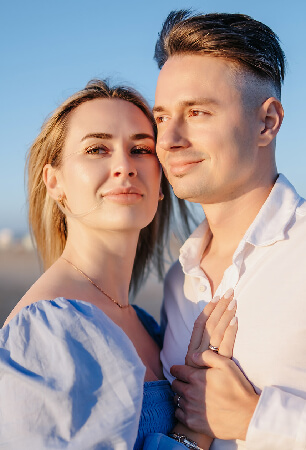It’s all champagne and cake tastings… until you realize no one knows what they’re supposed to do. That’s right! Wedding party roles sound official, but they’re often misunderstood or missed entirely.
This guide is your sanity-saver. We’re decoding every title and clarifying every responsibility in a little charm along the way. You’ll go from guessing to gracefully assigning with confidence, and yes, you’ll finally figure out what your cousin’s actual job is beyond “vibe.”
Traditional Wedding Party Roles 💍
Before there were signature cocktails and coordinated Instagram reels, there were traditional wedding party roles that were emotional and logistical anchors of your day. While traditions vary by culture and style—from classic chapels to beach wedding ideas under open skies—these foundational roles remain timeless.
1. The Maid of Honor 👰♀️
“Hi, I’m the Maid of Honor. I keep the bride grounded, hydrated, and laughing, and sometimes all at once.”
The Maid of Honor is part executive assistant, part emotional support specialist, and all-in best friend. Her responsibilities range from organizing pre-wedding events, such as the bridal shower or bachelorette party, to helping with dress fittings, timelines, and addressing minor meltdowns that no one else notices.

On the big day, she’s by the bride’s side, adjusting the veil, holding the bouquet, and giving that perfectly timed pep talk. When done well, the Maid of Honor’s responsibilities become the invisible thread holding everything together. In short, she shows up and lifts the day with quiet strength.
2. The Best Man 🤵♂️
“Hi, I’m the Best Man. I make sure the groom shows up on time (and keeps his socks on straight.)”
In a wedding, the Best Man is the groom’s right-hand man and low-key therapist. He handles the bachelor party, keeps track of the rings, and makes sure the suit fits before the big day. But beyond the checklist, he brings energy to what can be an overwhelming ride.

From calming nerves before the ceremony to giving a toast that (hopefully) lands, the Best Man’s duties run deep. He stands next to the groom and emotionally supports him through every unpredictable turn. Among wedding party roles and responsibilities, this one brings both pressure and pride.
3. Bridesmaids & Groomsmen 🥂
“We’re the team behind the couple. We coordinate outfits, cue the playlist, and clink glasses like pros.”
Bridesmaids and groomsmen are the front-line supporters and doers of all things big and small. From getting ready in the morning to dancing late into the night, they are the emotional backbone and the unofficial hype squad.

Bridesmaids often help with planning, pre-wedding errands, and being a sounding board. Groomsmen might wrangle schedules, help with transportation, or simply keep spirits high. Together, they reflect the couple’s inner circle.
Among the many roles of the wedding party, they carry the heartbeat of the event. Wedding party titles and roles may vary, but this crew remains essential.
Here’s what to expect if you’re selected as a bridesmaid or bridesman:
1. Pre-wedding support
- Event planning: They often plan and host pre-wedding events, including bridal showers and bachelorette parties. This can involve everything from selecting a theme, venue, and decorations to organizing food and activities. For ideas and planning tips, you might find our bridal shower ideas helpful.
- Wedding preparations: Bridesmaids and bridesmen may assist with various wedding preparations, such as selecting the wedding dress, helping with invitations, and creating DIY decorations. Their involvement is often tailored to their skills and the bride’s needs.
2. Wedding day duties
- Getting ready: On the wedding day, they assist the bride in getting ready, providing emotional support and help with her dress, makeup, and hair. This time can be crucial for keeping the bride calm and supporting her.
- Ceremony assistance: during the ceremony, bridesmaids and bridesmen might be involved in several tasks, such as helping to organize the ceremony, carrying the bride’s train, and distributing programs or confetti to guests.
- Photography coordination. They are important in organizing group photographs, ensuring that all necessary family members and friends are present and that the photo sessions run smoothly.
3. Reception responsibilities
- Social facilitators: Throughout the reception, bridesmaids and bridesmen are expected to act as social facilitators, encouraging guests to dance, participate in activities, and enjoy the celebration.
- Assisting the bride: They may also need to help the bride during the reception, for instance, managing the bride’s needs regarding outfit adjustments or refreshments, and being attentive to her throughout the evening.
4. Post-Wedding tasks:
- Cleanup and organization: After the festivities, they might assist with cleaning up the venue or gathering personal items and gifts to ensure nothing is left behind.
- Gift Management: They may help organize and possibly transport gifts, ensuring that everything is accounted for and delivered to the right place.
4. Parents of the Couple ❤️
“We’re the proud supporters and emotional anchors.”
Traditionally, the parents of the couple play both host and guide. They may be involved in financial contributions, guest list coordination, or simply offering heartfelt support when it matters most. Each family dynamic is unique, and so are their roles, but their presence often signals tradition, legacy, and love.

They bring a weight of emotion and memory to the celebration. Wedding party roles ideas often start with this core group, whose involvement is as personal as it is symbolic.
Mother of the Groom 💐
Typical responsibilities include:
- Rehearsal Dinner: Plans and hosts the event, selects the venue, manages the guest list, and may give a welcome speech.
- Planning Support: Offers emotional support to the groom, helps with family dynamics, and assists in guest list coordination.
- Attire Coordination: Chooses an outfit that complements the wedding colors and aligns with the mother of the bride’s attire.
- Ceremony Role: May be escorted down the aisle or participate in symbolic moments like lighting a unity candle.
- Reception Duties: Stands in the receiving line and helps welcome guests.
- Extra Help: May liaise with vendors, contribute financially, or assist with delegated tasks.
- Post-Wedding: Helps with returns, gift tracking, or thank-you notes.
Father of the Groom 👔
Typical responsibilities include:
- Financial Support: May contribute to wedding expenses, including the rehearsal dinner, honeymoon, or reception.
- Rehearsal Dinner: Helps plan and host the dinner alongside the groom’s mother, manages the guest list, and greets attendees.
- Wedding Day Presence: Offers emotional support, assists with groomsmen logistics, and ensures the groom is ready and on time.
- Ceremony Role: May walk in the processional or take part in meaningful traditions.
- Reception Duties: Gives a toast to the couple, mingles with guests, and helps maintain a warm, celebratory atmosphere.
- Post-Wedding Help: May assist with vendor payments, returns, and offer continued support to the newlyweds.
5. Flower Girl & Ring Bearer 🌸💍
“We’re tiny, adorable, and mildly unpredictable.”
Symbolism meets sweetness in these young wedding party roles. The flower girl typically precedes the bride, scattering petals with charm (and sometimes chaos), while the ring bearer brings the ceremonial rings down the aisle, usually with plenty of encouragement.

While their duties are brief, their impact is lasting. These roles often mark the inclusion of younger family members and bring a heartwarming touch to the ceremony. Add them to your wedding party roles list if you’re looking to infuse your day with a guaranteed round of smiles.
1. Role in the procession
- Leading the bride: The flower girl and the boy’s primary role is to precede the bride as she enters during the wedding procession. They may walk down the aisle together, or the flower girl may follow the flower boy.
- Scattering petals: Traditionally, the flower girl carries a basket filled with flower petals, which she scatters on the aisle to symbolize good luck and fertility for the bride and groom. In some ceremonies, they might scatter confetti or carry a small bouquet or pomander instead of petals.
- Carrying symbols: The flower boy might carry a single bloom, a pillow with the wedding rings, or a sign that says something like “Here Comes the Bride,” adding a unique and personalized touch to the ceremony.
2. Participation in the ceremony
- Standing with the wedding party: Depending on their age and comfort level, the flower girl and flower boy may stand with the bridesmaids and groomsmen during the ceremony or sit with their parents after completing their walk down the aisle.
- Engagement in photos: They are typically included in formal wedding photographs, adding a wholesome and familial element to the wedding memories.
3. Contribution to the reception
- Entrance: They often partake in the wedding party’s grand entrance at the reception.
- Dance: In some weddings, the flower girl and boy might participate in the first dance or have a special dance planned, which can be a highlight for guests.
6. Officiant ✨
“I’m the voice that makes it official. Literally.”
The officiant is the one who brings legality, spirituality, or sentiment to your ceremony. It can be a religious figure, a judge, or a beloved friend ordained for the day. Thus, their role is central to the meaning of the wedding.
They pronounce the beginning of something new. Among the roles of the wedding party, the officiant may not stand beside the couple throughout the day, but their words become the centerpiece of it all.
Creative & Alternative Wedding Party Roles 🎨
Not every wedding role involves tuxedos or flower crowns. These creative and alternative wedding party roles are made for couples who write their own rules. Here’s why.
1. Pet of Honor 🐾
“Hi, I’m the Pet of Honor. I walk on four legs, but I bring full heart to the aisle.”
This role will bring a unique character to your ceremony. If you have a pet trot in with the rings or wear a bowtie for photos, they become part of your celebration in the most personal way.

Some pets light up a room and offer quiet companionship. Both leave a lasting impression and turn your day into something truly yours.
Typical responsibilities might include:
- Walking down the aisle with a handler
- Wearing a floral collar, bowtie, or mini tux
- Standing or sitting with the wedding party during the ceremony
- Posing for portraits with the couple
- Appearing in the wedding video or social media highlight reel
- Greeting guests (if friendly and trained)
- Receiving a special seat or area at the reception
2. Honor Attendant & Mixed-Gender Roles 🌈
“Hi, I’m not the maid or the man. I’m just the person who matters most.”
Non-traditional wedding party roles give space for what’s real, just like how an Honor Attendant gives connection. This might be your brother standing with the bride. It might be a best friend who doesn’t need a title to belong. These roles reflect your relationships exactly as they are.

Possible responsibilities include:
- Standing beside the bride or groom during the ceremony
- Assisting with wedding planning or decision-making
- Helping with attire selection and fittings
- Leading or co-hosting pre-wedding events
- Giving a toast at the reception
- Providing day-of support, emotionally and logistically
- Helping coordinate last-minute details with vendors
3. Social Media Coordinator 📱
“Hi, I’m the Social Media Coordinator. I post, tag, and catch the moments before they slip away.”
This role turns real-time memories into something you can keep. While others stay present, the Social Media Coordinator captures the in-between moments that often go unnoticed.
They snap the behind-the-scenes laughs, the first glances, and the unexpected joys. Every photo tells the story you’ll want to revisit.

Responsibilities often include:
- Managing the couple’s official wedding hashtag
- Capturing behind-the-scenes photos and videos
- Sharing real-time stories and posts during the event
- Creating Instagram Reels or TikToks
- Helping the couple stay off their phones without missing the magic
- Coordinating with the photographer or videographer for extra angles
- Sharing highlights with out-of-town guests on social platforms
4. Master of Ceremonies (MC) 🎤
“Hi, I’m the MC. I keep things flowing and make sure the vibe stays high.”

This role holds the rhythm of the day. The MC makes announcements, introduces speeches, and keeps transitions smooth without a script in hand. They are the person who knows the room and keeps it moving with energy and grace.
Key duties often include:
- Welcoming guests at the start of the reception
- Introducing the wedding party and couple
- Announcing dinner, speeches, first dances, cake cutting, and bouquet toss
- Keeping the reception timeline on track
- Hyping up the dance floor when needed
- Collaborating with the DJ and planner to maintain flow
- Engaging the crowd with humor, energy, and charm
5. DIY/Décor Captain 🕯️
“Hi, I’m the DIY Captain. I brought the glue gun, the candles, and the backup candles.”
Some couples design their wedding like a work of art, drawing from boho wedding ideas that celebrate texture, nature, and personality. For that kind of vision, you need someone who sees the details.

The Décor Captain fixes centerpieces, styles the welcome sign, and pulls everything together without fuss. It’s one of the most valuable roles behind the scenes, and it always shows.
Typical tasks include:
- Styling tablescapes, centerpieces, and signage
- Setting up ceremony arches, backdrops, and decorative elements
- Packing an emergency kit with scissors, tape, pins, and glue
- Making sure the DIY elements are assembled and placed correctly
- Coordinating with rental vendors on setup or returns
- Helping reset decor for reception or cocktail hour
- Keeping the couple’s design vision cohesive throughout the space
The Roles of the Bride and Groom 💍
The bride and groom play pivotal roles in orchestrating their wedding, involving numerous duties that span the entire planning process.

Their critical responsibilities require detailed coordination to ensure that their special day reflects their vision and proceeds smoothly.
Here’s a more detailed look at some of these key responsibilities:
- Venue selection: They choose a venue that impacts guest capacity, style, and theme, considering budget and aesthetics.
- Guest list: carefully select guests, balancing personal wishes with family expectations and budget.
- Vendor coordination: the bride and groom pick and manage vendors such as caterers and photographers to ensure that services meet their expectations.
- Financial management: they create a detailed budget, track spending, and negotiate with vendors.
- Event planning: they plan ceremony and reception details, focusing on the event flow and personal touches.
- Attire selection: they decide on wedding outfits and accessories, ensuring harmony in their appearance.
- Guest communication: the bride and groom keep guests informed via a wedding website, invitations, and updates on any changes.
- Personal touches: they personalize the day with unique vows, readings, or decorations.
These duties require the bride and groom to work together, often involving communication and decision-making.
2. Wedding day duties:
- Pre-ceremony preparations: on the wedding day, the maid, matron, or man of honor helps the bride get dressed, manages the bridesmaids, ensures everyone is on schedule, and keeps the bride calm and supported.
- Ceremonial role: they typically hold the bride’s bouquet during the ceremony, manage the groom’s wedding ring until needed, and adjust the bride’s train and veil at the altar.
3. Reception responsibilities:
- Coordinator role: They often help coordinate the reception flow, from the entrances to ensuring the guest book and gift table are adequately managed.
- Toast to the couple: It is customary for the maid, matron, or man of honor to give a toast or a speech during the reception.
- Party participation: Another less formal but essential responsibility is encouraging guests to dance and participate in the reception activities to maintain a lively atmosphere.
4. Post-wedding support:
- Assistance with cleanup: after the reception, they may help organize the cleanup and ensure that the personal items of the bride and bridal party are collected and safely stored.
- Gift management: They can also assist in managing the gifts, ensuring they are transported to a predetermined location, and sometimes help track gifts for thank-you notes.
The role of the maid, matron, or man of honor is comprehensive, requiring practical assistance, emotional support, and leadership. Their presence and actions significantly reduce the bride’s stress and enhance the joy of the wedding experience.
Additional Wedding Party Roles That Make a Difference 🌟
Beyond the traditional lineup, other wedding roles may bring support to the celebration. These additional wedding party roles may not be front and center, but they help everything click into place.
1. Ushers & Greeters 👋
“Hi, we’re the first faces your guests see. We set the tone right away.”
Ushers and greeters handle the early touchpoints of your wedding day. They welcome guests, assist with seating, and maintain a warm and organized atmosphere. Their job is simple but powerful. A confident smile and helpful direction go a long way in making guests feel cared for from the start.

Responsibilities may include:
- Greeting guests at the ceremony entrance
- Directing guests to the correct seating areas
- Distributing programs or small welcome items
- Answering quick logistical questions
- Escorting family members to reserved rows
- Communicating with the planner or coordinator if needed
2. Readers or Ceremony Speakers 📖
“Hi, I bring the words that land softly and stay long after the vows.”
Readers or speakers deliver short readings or personal reflections. These roles often go to close friends or family members who have a special way with words. Some even choose wedding quotes that hold meaning for the couple and their story.

They add sentiment and personality without detracting from the couple’s focus. These wedding roles, other than the wedding party, provide a voice that connects the ceremony to the people who matter most.
Common responsibilities include:
- Reading selected poems, scriptures, or cultural texts
- Sharing personal anecdotes approved by the couple
- Practicing tone and timing ahead of the ceremony
- Speaking clearly and with heart during their moment
- Returning to their seat quietly afterward
3. Personal Attendant 🎒
“Hi, I handle the details no one sees, and fix the ones that go sideways.”
The personal attendant is the couple’s quiet hero. They manage last-minute needs, handle emergency tasks, and make sure small things stay on track. This role suits someone reliable, calm, and action-oriented. It’s all about keeping the couple relaxed and the mood steady.
Responsibilities typically include:
- Carrying a wedding-day emergency kit
- Managing the couple’s personal items (phone, touch-up kit, etc.)
- Coordinating dress or suit adjustments
- Communicating quick updates to vendors or planners
- Stepping in for any forgotten tasks
- Supporting emotional needs with zero fuss
4. Junior Bridesmaids/Groomsmen 🧒👧
“Hi, we’re not quite grown-ups, but we’re all in.”
Junior bridesmaids or groomsmen are typically tweens or teens who are old enough to participate but not expected to take on full wedding party responsibilities.

They love being included and often bring joyful energy to the group. These roles in a wedding party show younger loved ones they have a meaningful place in the celebration.
Duties often include:
- Wearing coordinated attire that suits their age
- Walking in the processional
- Participating in photos and key moments
- Helping with light setup tasks (if appropriate)
- Attending the rehearsal
- Cheering loudly and proudly for the couple
How to Choose the Right Wedding Party Roles 🕊️
Choosing your wedding party means surrounding yourself with people who truly support you and bring the kind of energy you need on such a special day. These people are part of the reason everything works.
1. Match the Role to the Person 🤝
Think about each person’s strengths and what they naturally bring into your life.
Here are a few good questions to guide you:
- Who helps you feel calm when things get hectic?
- Who takes charge when needed?
- Who makes you laugh without trying?
- Who shows up, no matter what?
- Let their personality guide where they fit best.
2. Use Creative Roles When You Need To 🎭
Not everyone fits into the title of “maid of honor” or “best man.” That’s completely fine. Many meaningful roles still honor their place in your life.
Some examples:
- Honor Attendant (for anyone, any gender)
- Social Media Coordinator
- Décor or DIY Lead
- Personal Attendant
- Ceremony Reader
These creative wedding party roles make space for the people who matter most, even if they don’t fall into a traditional category.
3. Keep It True to You 💖
You don’t need a huge wedding party. For instance, many couples find that small wedding ideas allow for deeper connection and intentional moments. What matters is that the people standing beside you belong there.
Maybe one person does a lot behind the scenes. Maybe someone you love isn’t into being in the spotlight. That’s okay. There’s a role for everyone, even if it’s just being there with quiet support.
Why Roles Keep Weddings Sane ✅
Clear roles keep chaos away and save the couple’s time and energy. The couple sets the vision and budget. Honor attendants manage timelines, guard the rings, and give the speeches. Bridesmaids and groomsmen keep the day moving and the dance floor lively. Parents host, welcome, and handle family logistics.
Children in the procession bring charm and a touch of humor. Define these roles early, and the timelines stay firm, vendors stay sharp, and the celebration flows with ease. Now comes the fun part. Make those moments with Picnic Makers more memorable.
We design and stage luxury pop-up picnics for showers, bachelorettes, proposals, and photo-worthy pre-wedding gatherings. Book Picnic Makers today and secure a high-end experience that matches the vision of your wedding.
FAQs
How can the wedding party help reduce the couple’s stress on the wedding day?
Wedding party members can manage day-of logistics, handle any last-minute issues, and make sure the couple has everything they need. Their support allows the couple to focus on being present and enjoying the moment.
What roles or tasks can wedding party members take on to ensure the day runs smoothly?
They can coordinate transportation, manage the schedule, communicate with vendors, and assist guests. Every task, big or small, helps create a smoother, more relaxed experience for everyone involved.
How can couples personalize wedding party roles to reflect their relationships?
Wedding roles don’t have to be traditional. Some couples choose a “Pet of Honor” or ask a sibling to be their Honor Attendant. It’s all about choosing roles that feel natural and meaningful based on who that person is in your life.
What are creative ways to include friends who aren’t in the official wedding party?
You can invite them to read during the ceremony, greet guests, help with decor, or even manage the playlist. These smaller roles still offer connection and purpose without the pressure of standing front and center.






